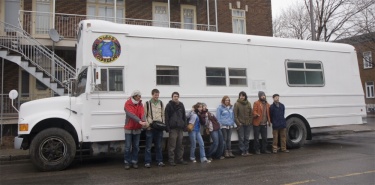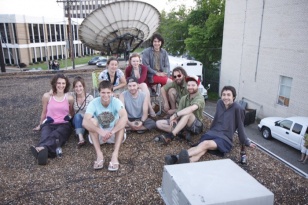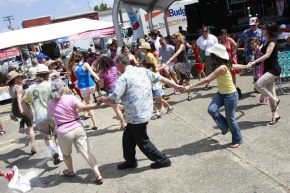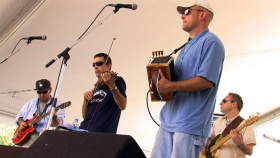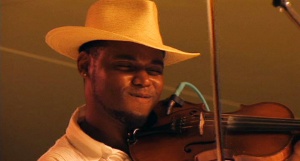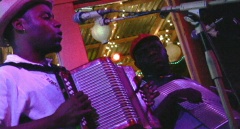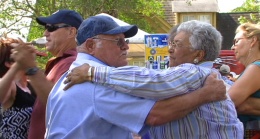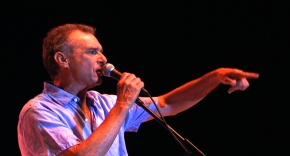Festival International de Louisiane
par Piccinin, Helgi
In the spring of 2009, a
team of young videographers set out from Quebec to travel across North America
aboard a school bus. The first leg of this group adventure, christened Video
Eldorado, took the youngsters to Louisiana, where they were fascinated by the
region’s unique francophone culture. Their first stop was in Lafayette for the Festival
International de Louisiane, a major event for Franco-Americans. This festival brings
together artists from theatre, the visual arts and, most of all, music. The
festival presents manifestations of Cajun culture mainly, and provides an
opportunity for the francophone culture of the American South, with its rich
variety of influences, to make its presence known to a broad audience that
might otherwise be unaware of this rich intangible heritage that has been passed
down and improved upon over the generations. Helgi Piccinin, part of Video
Eldorado, explored Louisiana’s French-speaking minority for a full month and
now invites us to share his discoveries in a series of articles based on the
first-hand accounts that he gathered.
Article disponible en français : Festival International de Louisiane
Getting Past the Clichés
Before our trip began, my impressions of Louisiana were limited to bayou landscapes, New Orleans jazz, a vague idea of Cajun music, hurricanes and the fact that the state was Zachary Richard's birthplace. I don't think I'll ever be completely rid of these clichés, but I have learned that they are only a tiny piece of a much broader reality. I knew there were French-speaking communities scattered here and there in the American South and that they continued to "holdout against the invading English," but I had no idea that this culture was such a rich and diverse blend of peoples or that it faced such complex challenges.
Music, the Gateway to French Louisiana
As for many people, my first contact with French Louisiana was through music, a vibrant and omnipresent tradition that is one of the region's defining cultural characteristics. We arrived in Lafayette just in time for the Festival International de Louisiane. Since its inception in 1986, the annual April festival has become a must-attend event in Acadiana, the Louisiana region also known as Cajun Country. Lafayette, a city of just over 110,000 people(NOTE 1), is the region's cultural hub. It is here, in the heart of town, that the festival is held. And it didn't take us long to learn that in Louisiana, people love to celebrate! It was as if the region's entire French-speaking community had come out for the event, which had been created as "an annual visual and performing arts festival celebrating the French cultural heritage of Southern Louisiana - primarily a combination of French, African, Caribbean and Hispanic influences.(NOTE2)"
Inspired by the Québec City Summer Festival with its multiple stages and themes, as well as by its goal of bringing together musicians from diverse cultural backgrounds, the festival is friendly, accessible and free (festival-goers can buy a pin to help finance the event on a voluntary basis). Every year, a dedicated team of workers and volunteers puts in countless hours to organize this exciting cultural rendezvous that showcases traditional Louisiana music (Cajun, Zydeco). In 2009, the event featured a cross section of artists from around the globe, including Malajube (Québec), Alpha Ya Ya Diallo (Guinea), Dengue Fever (Cambodia/U.S.), Rachid Taha (Algeria), Locos Por Juana (Colombia/Venezuela) and more. With the permission of the friendly folks at Acadiana Open Channel (AOC), the community television station, we camped out in the AOC parking lot in the heart of the action. As a result, we were in the perfect position to meet people, enjoy the music and bask in the extraordinary outpouring of joie de vivre. I don't think any of us had ever experienced a festival that intensely before.
Patrick-Louis Michot, Music in the Authentic Cajun Tradition
The first night of the festival, a man came up to our bus and, in richly-accented French, said:
"Si toi, T'es intéressé par la musique d'icitte, suis-moi asteure"
[Si toi, tu es intéressé par la musique d'ici, alors viens avec moi]
'If you're interested in the music from 'round here, then come along with me.'
And so three of us followed him to a crowded restaurant where people were eating, drinking, and dancing. There we had our first genuine taste of Cajun music with Les Frères Michot. The word Cajun is actually a deformation of Acadien the name for the French-speaking deportees who came to Louisiana after being forced from their homes in Acadia, Canada [parts of what is today New Brunswick and Nova Scotia]. English speakers had a little trouble with the pronunciation of the Acadien [ækadze˜], which naturally evolved into Cajun. However, even today, members of Louisiana's French community still use Cadien as the proper spelling.
In the world of traditional Cajun music, Les Frères Michot are exactly what their name says-brothers. When the full band is present, there are five Michot siblings on stage. They specialise in a style known as bal maison featuring diatonic accordion, fiddle and acoustic guitar, as well as the 'titfer (triangle) and string bass-and they sing in French. Sixty-year-old Patrick-Louis Michot, the eldest brother and a judge by profession, invited us to drop by his office the next day. There he quickly made it clear that despite the popularity of Les Frères Michot, few Cajun musicians make a living from their art. In this clip, he explains where this family passion for traditional music comes from.
![]() FRENCH LANGUAGE VIDEO 1: Music, a Family Affair; 2 min. 44 sec.
FRENCH LANGUAGE VIDEO 1: Music, a Family Affair; 2 min. 44 sec.
A Cajun song would hardly be the genuine article if it weren't sung in French. But as Patrick-Louis explained to us, singing in French doesn't necessarily mean speaking French. Like many Louisiana French-speakers, he was born to French-speaking parents of Acadian descent, but never learned the language at home. Today, people like him, most of whom range in age between 35 and 55, are referred to as "the lost generation" (lien ou See Article 3). For the Michot brothers, English is their first language. Even so, Patrick-Louis was surrounded by French when growing up. He heard it from family and neighbours; it was part of everyday life. As a teen, he became determined to pick up the language because it was important to him, so he started learning it on his own, bit by bit. Today, of the six brothers, "three speak French well, one so-so, and two hardly at all." Even so, all of the brothers have been part of Les Frères Michot at one time or another.
![]() FRENCH LANGUAGE VIDEO 2: Singing in French, Speaking French; 59 sec.
FRENCH LANGUAGE VIDEO 2: Singing in French, Speaking French; 59 sec.
Horace Trahan, Musician without Borders
With the festival in full swing in Louisiana's torrid spring heat, I stumbled across an enthusiastic crowd at a performance by Horace Trahan and The Bluerunners. Horace is a musician who mixes Cajun, Zydeco and blues styles. His isn't the traditional fare of Les Frères Michot, even though the influences are readily apparent. Horace learned the accordion when he was very young from his great uncle Félix Richard, the man credited with teaching Zachary Richard 20 years earlier. Although Horace has played Cajun music for years and is generally associated with Zydeco today, he doesn't hide his wide-ranging influences: "Bob Marley, Bob Dylan, the Beatles, old country like Hank Williams Senior, but also tunes by John Mayer and Jason Mraz. "I listen to reggae, rock, a bit of rap, Cajun, Zydeco. I like variety, just like everybody else." In this clip Horace introduces us to the different styles of Cajun and Zydeco music:
![]() VIDEO 3: The Origins of Cajun and Zydeco Music; 1 min. 16 sec.
VIDEO 3: The Origins of Cajun and Zydeco Music; 1 min. 16 sec.
Over the course of his musical career, Horace has deliberately avoided being pigeon holed into a particular musical category, because he wants to have the freedom to explore. He easily switches from French to English in his songs and has a repertoire of tunes in both languages. For him, it's simple. "It depends on how I feel," he told us, but admitted that he's more comfortable speaking English:
"I'm kind of ‘honte,'" he confided, "J'ai moyen honte avec mon français parce que je parle pas trop bien."
[J'ai un peu honte de mon français parce que je ne le parle pas tropbien]
‘I'm a bit ashamed that I don't speak better French.'
He smiled as he remembered his grandfather, born in 1908, who spoke only French, refusing to use English with his grandchildren. As for his father, who spoke no English before he was forced to learn it and use it in school (lien ou See Article 3), he taught a little bit of French to his children. Today, Horace sings in both languages and his sister teaches at a French immersion school. Despite the barriers, the cultural heritage is still passed on. And as Horace explains, so long as the music lives on, the language and culture will continue to survive and evolve.
Cedric Watson, Youth Meets Tradition
During our first night in Lafayette, we met Cédric Watson at one of Lafayette's most famous bars, the Blue Moon. He couldn't believe how little I knew:
Helgi Piccinin: "Au fait, c'est quoi le Zydeco?"
[Just what is Zydeco exactly?"]
Cédric Watson: "Si toi veux écouter du Zydeco, moi j'vas jouer pendant le festival et ça va être chaud."
[Si tu veux écouter du Zydeco, moi, je vais jouer pendant le festival et
ça va chauffer]
'If y'all wanna hear some Zydeco, I'm playin' the festival and we're going to rock the house!'
I made a mental note not to miss his show, and I wasn't disappointed. The place was rocking!
Let's stop a minute to examine the origins of the word Zydeco. Like the word Cajun, Zydeco is a corruption of a French word, in this case les haricots. Les haricots sont pas salés [the snap beans ain't salty] is an old regional Creole expression once used by the slaves meaning that times were tough, In hard times, salted meat was more expensive and as a result, there wasn't anything to salt the beans.
![]() FRENCH LANGUAGE VIDEO 5: Cédric Watson on the Origin of the term Zydeco and the Music of the Slaves; 2 min.01 sec.
FRENCH LANGUAGE VIDEO 5: Cédric Watson on the Origin of the term Zydeco and the Music of the Slaves; 2 min.01 sec.
Zydeco originated with the French Creoles of colour. Whereas Cajun music can trace its lineage, in part, back to the French culture of the Acadians, Zydeco's roots lie with the slaves of African descent who were brought to Louisiana during the slave trade ((lien ou See Article 2). Plantation workers developed a style of singing prayer and giving thanks involving rhythmic foot stomping and hand clapping. It is known as juré, from the French jurer-to testify or swear. There were no instruments. Gradually, the style evolved to incorporate the accordion, washboard and other instruments like the fiddle, guitar, bass and drums. Zydeco became popular at dances, eventually absorbing influences from jazz, blues, country, R&B and rap to become a genre in its own right. While Cajun and Zydeco music are distinct forms, their mutual influence is immediately obvious to the ear. What's more, they share another common characteristic - they are both sung in French. In one case, it's Cajun French, in the other, Creole.
Cédric Watson embodies a new approach to traditional Zydeco. Driven by his desire to "keep the heritage alive through music," he explores new avenues while at the same time remaining faithful to a tradition inherited from the musical greats he admires.
Zachary Richard, from Music to Language
Zachary Richard is a contemporary music icon in Louisiana and an ardent defender of the region's culture. He is also the one person we would have been very disappointed not to see during our stay. Fortunately, we managed to catchup with him as he left the stage following his show at the festival. Sensing our curiosity and enthusiasm, he agreed to spend 15 minutes with us and to share a few thoughts. He began by discussing music, then branched out onto the issue of the cultural identity of French speakers in Louisiana. He explained that the key to establishing a thriving cultural identity is creating conditions that make it possible to live in French. Singing in French is one thing, but the real challenge is speaking the language in everyday life.
![]() FRENCH LANGUAGE VIDEO 7: Zachary Richard: Singing in French is One Thing, but Speaking It Is the Real Challenge, 1 min. 49 sec.
FRENCH LANGUAGE VIDEO 7: Zachary Richard: Singing in French is One Thing, but Speaking It Is the Real Challenge, 1 min. 49 sec.
Nothing is easy about the struggles of Louisiana's French-speaking community. To make his point, Zachary used the concert he had just finished as an example, noting that for the first time in 15 years, he had performed a majority of songs in English. Although he may be a French language activist and artist who has played a key role in promoting Louisiana culture in the United States, Canada and the rest of the world, the fact remains that he's also a citizen of the world's most populous English-speaking country who lives much of his day-to-day life in English. That's part of his reality and identity, too. How do you make yourself understood by the majority? How do you convey common concerns? How do you reach the English-speaking community that you can't ignore, and that you also happen to be a part of?
![]() FRENCH LANGUAGE VIDEO 8: Zachary Richard Talks about Singing in French, 3 min. 38 sec.
FRENCH LANGUAGE VIDEO 8: Zachary Richard Talks about Singing in French, 3 min. 38 sec.
Personal First Impressions
After my introduction to Acadiana at the Festival International de Louisiane, I've come to realize that nothing here is completely black or white. It's all one big melting pot of people, cultures and identities-truly fertile ground for the intermingling of Louisiana's rich and diverse cultures. But for the French-speaking community, the struggle to keep the language alive is a challenge because it's first and foremost a struggle against one's own family, friends and neighbours. Not only is it a struggle against assimilation by the majority, but also-and most importantly - it is a struggle to secure the respect and support of the majority and even to have them adopt elements of the minority culture as their own. "To survive, we need the approval of our neighbours, we need to convert English-speaking Americans into Francophiles", affirmed Zachary Richard. That's easier said than done. When Zachary himself asks, "How goes the battle?" he's forced to admit: "It's tough." Despite the challenges, the Festival International de Louisiane has brought a ray of hope to this minority French-language culture. Of course, music isn't the answer to all of the challenges facing Louisiana today, but between Zachary Richard, Cédric Watson, Horace Trahan, Les Frères Michot, and all the other French-language artists who keep the music and creativity alive in this little corner of America, French music is anything but a vestige of a dead past. It is the reflection of a rich and vibrant culture born of multiple influences and still very much alive today.
"Once the music was over, I felt it was important to step back in time to untangle the threads of Louisiana's history. There was something I needed to know, and it boiled down to one rather naïve question: How did there come to be such a large French-speaking community in the southern United States?" (Read Article 2).
Helgi Piccinin
Vidéo Eldorado
NOTES
Note 1. 2006 data. http://quickfacts.census.gov/qfd/states/22000.html
Note 2. http://www.festivalinternational.com/site47.php
Additional DocumentsSome documents require an additional plugin to be consulted
Images
-
 Ça danse à Lafayette
Ça danse à Lafayette
lors du Festiva... -
 Map of the United Sta
Map of the United Sta
tes of America,... -
 Cédric Watson en conc
Cédric Watson en conc
ert intime au ... -
 Cédric Watson et Bijo
Cédric Watson et Bijo
u Creole en con...
-
Équipe de Vidéo Eldor
ado avant le dé... -
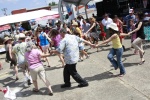 Foule dansante lors d
Foule dansante lors d
u Festival Inte... -
 Horace Trahan et Matt
Horace Trahan et Matt
Doucet accompa... -
L’équipe Vidéo Eldora
do sur le toit ...
Vidéos
-
 Cédric Watson, origine du terme Zydeco et musique des esclaves (2min01sec)
Cédric Watson, origine du terme Zydeco et musique des esclaves (2min01sec)
-
 Chanter français, parler français (59sec)
Chanter français, parler français (59sec)
-
 Évolution musicale (1min06sec)
Évolution musicale (1min06sec)
-
 La musique, une histoire de famille (2min 44sec)
La musique, une histoire de famille (2min 44sec)
-
 Motivation de Cédric à faire du traditionnel, et pourquoi (2min 15sec)
Motivation de Cédric à faire du traditionnel, et pourquoi (2min 15sec)
-
 Origines de la musique cadienne et zydeco (1min16sec)
Origines de la musique cadienne et zydeco (1min16sec)
-
 Zachary Richard : chanter en français oui, mais parler en français est le défi (1min 49sec)
Zachary Richard : chanter en français oui, mais parler en français est le défi (1min 49sec)
-
 Zachary Richard s'explique sur le fait de chanter en français (3min38sec)
Zachary Richard s'explique sur le fait de chanter en français (3min38sec)

